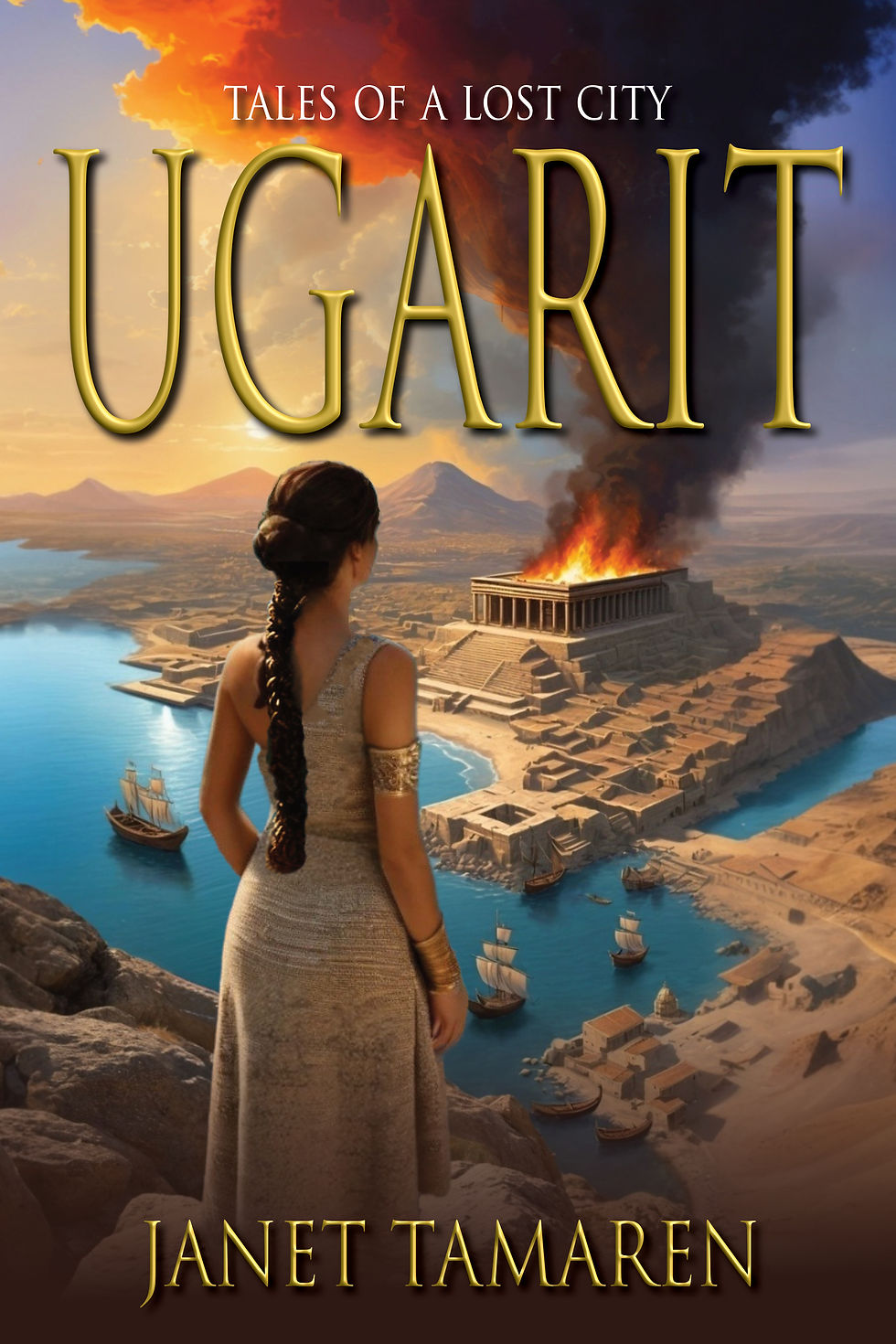Survival and Love During the Fall of an Empire - an Editorial Review of "Ugarit"
- DK Marley
- Oct 24, 2025
- 4 min read

Book Blurb:
An epic of love, survival, and the fall of empires
In the shadow of a burning world, two souls must choose between the past they cherish and the future they fear.
Spring, 1190 BCE. On the glittering coast of the eastern Mediterranean, the city of Ugarit thrives-its markets vibrant, its libraries vast, its people unaware that the world they know is about to vanish.
Yoninah, a healer steeped in ancient wisdom, tends to the wounded and the grieving with herbs, charms, and quiet strength. When a battle-scarred Mycenaean soldier appears at her door, memories stir-and so does danger.
Thut-Moses, a scribe trained in Egypt, advises a king shaken by the collapse of cities once thought invincible. As invading forces creep ever closer, he must find the courage to guide a faltering kingdom through the storm.
Drawn from real archaeological discoveries and newly-translated clay tablets, UGARIT is a luminous and unforgettable journey into a vanished world, where the choices of a few may echo for eternity.
"A masterfully told tale-rich, riveting, and utterly transporting. I couldn't put it down."
★★★★★ - Historical Fiction Review
Book Buy Link: https://geni.us/elbQ2Ak
Author Bio: Visit the author's profile at www.historiumpress.com/janet-tamaren
Editorial Review:
Editorial Review: “Ugarit: Tales from a Lost City”
Author: Janet Tamaren
It’s 1190 BCE - the late Bronze Age – in Ancient Syria. Of course this review must focus on the storyline of “Ugarit: Tales from a Lost City”, and not the stunning cover, but there is still room to comment on the brilliance of the scene that immediately puts the reader squarely in the world built by author Janet Tamaren. This reviewer will not be the only reader secretly nursing a fascination for the ancient world that means this sub-genre of historical fiction is, frankly, catnip.
“After Menelaus had woken her up for five or six nights with such a dream, she couldn’t help prying the next morning.
“Are these bad dreams about the war?” Yoninah asked.
“Yes, they are about the war,” Menelaus scrubbed his face. “I was just a boy when I decided to go off to war. I was not prepared for the bloodshed and mayhem. “
Yoninah laid a comforting hand on his arm. “No one is ever prepared, I think.”
The author’s note speaks to the depth of research that has gone into creating such a storyline. The heroine of the story is Yoninah, a healer. She is a widow, with two daughters, and the advent of a love interest is a welcome subplot, only increasing her relatability. There are references to intimacy in the book, but the way these scenes are written will spare the reader’s blush while still indicating that Yoninah is finding happiness after the loss of her husband.
An eclipse is early in the narrative, confirming the mystical themes of the book. Even the modern reader will not avoid a shiver at the mention of such an omen. There is also mention of the royal court, as Tamaren weaves together different voices to create a bustling and vibrant society. Some readers may find the scope of the storytelling is too wide; others may prefer the overview provided through so many different references.
The dialogue strikes the right balance between authenticity and informing the reader of customs and communities long gone. The additional highlight of such novels is always the casual mentions of ancient places and civilizations that once ruled and shaped the world, of gold, ivory and precious cloth.
“The family would go on the day of the full moon because it was an auspicious day to visit. They would eat a noontime meal at home and then start their hike. They would get there by mid-afternoon and then visit the warm waters. After an evening meal, they would return to the pool. Under the bright light of the moon, they would immerse themselves again in the healing waters and offer prayers to the gods. They thanked them for their good fortune in surviving the fall of Ugarit and then asked for their further protection.”
The ancient world comes alive through the author’s clever weaving of stories into the main narrative. Menelaus romances Yoninah through the recounting of anecdotes, and Thut-Moses curries favour with royalty by reading out papyrus and gruesome medical incidents. Life during these times was unforgiving; modern readers may need to blink. Others will revel in the complete sense of place and time.
“The new grandmother picked up the newborn and gently wrapped her in a blanket. She handed the baby to Laylah to hold. The grandmother tended to her daughter, cleaning up the bed and gently covering her with blankets.
“Keep giving her beer or wine or water to drink,” Yoninah said. “She needs to build up her blood again.”
“Can you give the child a blessing?” the grandmother asked. “To protect her at this difficult time? To protect my daughter from further harm?””
“Ugarit: Tales from a Lost City” by Janet Tamaren is an evocative glimpse into the ancient past, with vivid characterization and references to eclipses, goddesses and catastrophic wars. Enthusiasts of this subgenre will be richly rewarded as Tamaren expertly harks back to a way of life long gone but which so many readers harbor an inexplicable yearning for. The writing style and diverse situations create a complete and wonderful ancient world for the reader to lose themselves in.
*****
“Ugarit: Tales from a Lost City” by Janet Tamaren receives 4 stars from The Historical Fiction Company
To have your historical novel editorially reviewed and/or enter the HFC Book of the Year Contest, please visit www.thehistoricalfictioncompany.com/book-awards/award-submission
















Comments